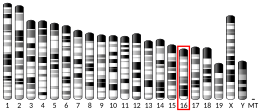Epithelial membrane protein 2 is a protein that in humans is encoded by the EMP2 gene.[5][6][7][8]
Clinical significance
editMutations in EMP2 cause childhood-onset nephrotic syndrome.[9]
References
edit- ^ a b c GRCh38: Ensembl release 89: ENSG00000213853 – Ensembl, May 2017
- ^ a b c GRCm38: Ensembl release 89: ENSMUSG00000022505 – Ensembl, May 2017
- ^ "Human PubMed Reference:". National Center for Biotechnology Information, U.S. National Library of Medicine.
- ^ "Mouse PubMed Reference:". National Center for Biotechnology Information, U.S. National Library of Medicine.
- ^ Ben-Porath I, Benvenisty N (Feb 1997). "Characterization of a tumor-associated gene, a member of a novel family of genes encoding membrane glycoproteins". Gene. 183 (1–2): 69–75. doi:10.1016/S0378-1119(96)00475-1. PMID 8996089.
- ^ Liehr T, Kuhlenbaumer G, Wulf P, Taylor V, Suter U, Van Broeckhoven C, et al. (Jul 1999). "Regional localization of the human epithelial membrane protein genes 1, 2, and 3 (EMP1, EMP2, EMP3) to 12p12.3, 16p13.2, and 19q13.3". Genomics. 58 (1): 106–8. doi:10.1006/geno.1999.5803. PMID 10331954.
- ^ Wadehra M, Forbes A, Pushkarna N, Goodglick L, Gordon LK, Williams CJ, et al. (Nov 2005). "Epithelial membrane protein-2 regulates surface expression of alphavbeta3 integrin in the endometrium". Dev Biol. 287 (2): 336–45. doi:10.1016/j.ydbio.2005.09.003. PMID 16216233.
- ^ "Entrez Gene: EMP2 epithelial membrane protein 2".
- ^ Gee HY, Ashraf S, Wan X, Vega-Warner V, Esteve-Rudd J, Lovric S, et al. (June 2014). "Mutations in EMP2 cause childhood-onset nephrotic syndrome". American Journal of Human Genetics. 94 (6): 884–890. doi:10.1016/j.ajhg.2014.04.010. PMC 4121470. PMID 24814193.
Further reading
edit- Lobsiger CS, Magyar JP, Taylor V, Wulf P, Welcher AA, Program AE, et al. (September 1996). "Identification and characterization of a cDNA and the structural gene encoding the mouse epithelial membrane protein-1". Genomics. 36 (3): 379–387. doi:10.1006/geno.1996.0482. PMID 8884260.
- Taylor V, Suter U (October 1996). "Epithelial membrane protein-2 and epithelial membrane protein-3: two novel members of the peripheral myelin protein 22 gene family". Gene. 175 (1–2): 115–120. doi:10.1016/0378-1119(96)00134-5. PMID 8917086.
- Street VA, Goldy JD, Golden AS, Tempel BL, Bird TD, Chance PF (January 2002). "Mapping of Charcot-Marie-Tooth disease type 1C to chromosome 16p identifies a novel locus for demyelinating neuropathies". American Journal of Human Genetics. 70 (1): 244–250. doi:10.1086/337943. PMC 384893. PMID 11713717.
- Xu XR, Huang J, Xu ZG, Qian BZ, Zhu ZD, Yan Q, et al. (December 2001). "Insight into hepatocellular carcinogenesis at transcriptome level by comparing gene expression profiles of hepatocellular carcinoma with those of corresponding noncancerous liver". Proceedings of the National Academy of Sciences of the United States of America. 98 (26): 15089–15094. Bibcode:2001PNAS...9815089X. doi:10.1073/pnas.241522398. PMC 64988. PMID 11752456.
- Wadehra M, Sulur GG, Braun J, Gordon LK, Goodglick L (April 2003). "Epithelial membrane protein-2 is expressed in discrete anatomical regions of the eye". Experimental and Molecular Pathology. 74 (2): 106–112. doi:10.1016/S0014-4800(03)00009-1. PMID 12710941.
- Shimazaki K, Wadehra M, Forbes A, Chan AM, Goodglick L, Kelly KA, et al. (July 2007). "Epithelial membrane protein 2 modulates infectivity of Chlamydia muridarum (MoPn)". Microbes and Infection. 9 (8): 1003–1010. doi:10.1016/j.micinf.2007.04.004. PMID 17544801.
- Forbes A, Wadehra M, Mareninov S, Morales S, Shimazaki K, Gordon LK, et al. (September 2007). "The tetraspan protein EMP2 regulates expression of caveolin-1". The Journal of Biological Chemistry. 282 (36): 26542–26551. doi:10.1074/jbc.M702117200. PMID 17609206.




